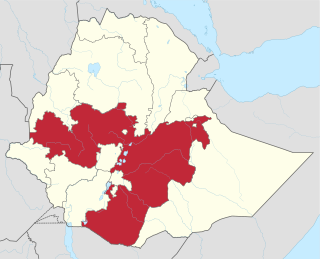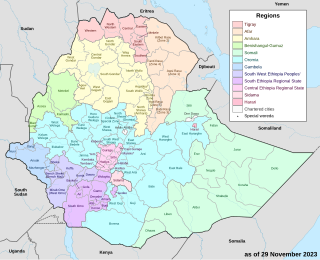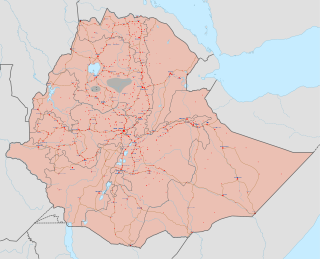
The Oromo people are a Cushitic ethnic group native to the Oromia region of Ethiopia and parts of Northern Kenya. They speak the Oromo language, which is part of the Cushitic branch of the Afroasiatic language family. They are one of the largest ethnic groups in Ethiopia. According to the last Ethiopian census of 2007, the Oromo numbered 25,488,344 people or 34.5% of the Ethiopian population. Recent estimates have the Oromo comprising 45,000,000 people, or 35.8% of the total Ethiopian population estimated at 116,000,000.

Oromia is a regional state in Ethiopia and the homeland of the Oromo people. Under Article 49 of Ethiopian Constitution, the capital of Oromia is Addis Ababa, also called Finfinne. The provision of the article maintains special interest of Oromia by utilizing social services and natural resources of Addis Ababa.

Arsi is a zone in Oromia Region of Ethiopia, named after a clan of the Oromo, who inhabit in the area.

Asella is a town in central Ethiopia. Located in the Arsi Zone of the Oromia Region 126 km (78 mi) south from Addis Ababa, this town has a latitude and longitude of 7°57′N39°7′E, with an elevation of 2,430 meters. Asella hosts an Asella Airport. Asalla was the capital of Arsi Province until that province was demoted to a Zone of Oromia with the adoption of the 1995 Constitution. It retains some administrative functions as the seat of the present Arsi Zone.

Bale Zone is a zone in Oromia Region of Ethiopia. Bale is bordered on the south by the Ganale Dorya River which separates it from Guji Zone, on the west by the West Arsi Zone, on the north by Arsi Zone, on the northeast by the Shebelle River which separates it from West Hararghe Zone and East Hararghe Zone, and on the east by the Somali Region.

East Shewa is a zone in Oromia Region of Ethiopia. East Shewa is located at the center of oromia Oromia, connecting the western regions to the eastern ones. This zone is bordered on the south by the West Arsi Zone, on the southwest by the Southern Nations, Nationalities and Peoples Region, on the west by Southwest Shewa Zone and Oromia Special Zone Surrounding Finfinne, on the northwest by North Shewa, on the north by the Amhara Region, on the northeast by the Afar Region, and on the southeast by Arsi; its westernmost reach is defined by the course of the Bilate River. Towns and cities in East Shewa include Dukam, Galan, Tullu Dimt, Basaqa and Aqaqi, Bishoftu, Metehara, Batu Dambal and Adama. With the intent to rehabilitate degraded forests, the Zonal Agriculture and Rural Development Office announced 2 October 2, 2006, that it had planted over 36.3 million seedlings in 10 of the Zone's 12 woredas, covering 4,000 hectares of land.

West Hararge is a zone in the Oromia Region of Ethiopia. West Hararghe takes its name from the former province of Hararghe. West Harerge is bordered on the south by the Shebelle River which separates it from Bale, on the southwest by Arsi, on the northwest by the Afar Region, on the north by the Somali Region and on the east by East Hararghe. Towns in West Hararghe include Chiro, Badessa, Gelemso, and Mieso, Asebot.
Nono is one of the woredas in the Oromia Region of Ethiopia. It is named after the Nono Oromo, a subgroup of the Macha Oromo, who live in this area. Part of the West Shewa Zone, Nono is bordered on the southwest by the Gibe River which separates it from the Jimma Zone, on the northwest by Dano, on the north by Cheliya, on the northeast by Tikur, on the east by the Southwest Shewa Zone, and on the southeast by the Southern Nations, Nationalities and Peoples Region. Jibat woreda was part of Nono woreda.
Arsi Negele is a woreda in Oromia Region, Ethiopia. It is named after its administrative center, Arsi Negele. Part of the West Arsi Zone located in the Great Rift Valley, Arsi Negele is bordered on the south by Naannawa Shashamane and Kofale, on the southwest by Lake Shala which separates it from Shala, on the west by the Southern Nations, Nationalities and Peoples Region, on the north by East Shewa with which it shares the shores of Lakes Abijatta and Langano, and on the east by the Heban Arsi, Qore woreda and small portion by Arsi Zone.
Naannawa Shashamane is a woreda in Oromia Region, Ethiopia. It is named after the town of Shashamene what was separated from this woreda. Part of the West Arsi Zone located in the Great Rift Valley, Shashamene is bordered on the south by the Southern Nations, Nationalities and Peoples Region, on the west by Shala, on the north by Arsi Negele, on the east by the Kore, and on the southeast by Kofele. The largest town in Shashamene is Kuyera.
Aseko is one of the Aanaas in the Oromia of Ethiopia. It is named after the administrative center of the Aanaa, Aseko. Part of the Arsi Zone, Aseko is bordered on the southwest by Chole, on the northwest by Merti, on the north by the West Hararghe Zone, and on the east by Gololcha.
Merti is one of the Aanaas in the Oromia Regional State of Ethiopia. Part of the Arsi Zone, Merti is bordered on the south by Sude, on the west by Jeju, on the northwest by the East Shewa Zone, on the north by the Afar Region, on the east by Aseko, and on the southeast by Chole. The administrative center of this woreda is Abomsa; other towns in Merti include Reye. Guna woreda was separated from Merti.
Gololcha is one of the Aanaas in Oromia Regional State of Ethiopia. Part of the Arsi Zone, Gololcha is bordered on the south by Aminya, on the west by Chole, on the northwest by Aseko, and on the north and east by the West Hararghe Zone. The administrative center of this woreda is Chancho; other towns include Tumuga, Jinga Dibo, Haro Akiya, and Mine.
Sherka is one of the Aanaas in the Oromia Regional State of Ethiopia. Research by Ulrich Braukämper uncovered a local tradition that traced the origins of this woreda's name to an ancient Ethiopian province, Sharkha, which vanished as a political unit in the 16th century. Part of the Arsi Zone, Sirkaa is bordered on the south by the Shebelle River which separates it from the Bale Zone, on the southwest by Bekoji, on the west by Digeluna Tijo, on the north by Tena, and on the east by Robe. Gobesa is the administrative center; other towns include Gaadoo Gunaa.
Munesa is one of the Aanaas in the Oromia Regional State of Ethiopia. Part of the Arsi Zone located in the Great Rift Valley, Munesa is bordered on the south and west by the West Arsi Zone and Lake Langano, on the northwest by Batu Dugda, on the north by Tiyo, on the northeast by Digeluna Tijo, and on the east by Bekoji. The administrative center of the woreda is Kersa; other towns in Munesa include Ego.
Kofele is a town in Oromia Region Ethiopia, and the administrative center of the Kofele woreda. Located in the West Arsi Zone of the Oromia Region, this town has a latitude and longitude of 7°00′N38°45′E with an elevation of 2695 meters above sea level.
Ogolcho is a town in southeastern Ethiopia. Located in the Arsi Zone of the Oromia Region, it has a latitude and longitude of 08°03′N39°00′E with an elevation of 1687 meters above sea level. It is the administrative center of Ziway Dugda woreda.
Abadula Gemeda is an Ethiopian politician who was the speaker of the House of Peoples' Representatives, the lower chamber of the Ethiopian Parliament, from 2010 to 2018. Previously, from 2005 to 2010, he was President of the Oromia Region. He was succeeded in that position by Alemayehu Atomsa.

Adanech Abebe is an Ethiopian politician who is serving as the thirty-second mayor of Addis Ababa since 2021. She has been serving as a deputy mayor from 2020 until 2021. She previously was the Minister of Revenue and Customs Authority from 2018 to 2020, when she became the first female to assume the role of the Federal Attorney General of Ethiopia. She is the first woman to hold the mayorship since it was created in 1910.

The ongoing Ethiopian civil conflict began with the 2018 dissolution of the Ethiopian People's Revolutionary Democratic Front (ERPDF), an ethnic federalist, dominant party political coalition. After the 20-year border conflict between Ethiopia and Eritrea, a decade of internal tensions, two years of protests, and a state of emergency, Hailemariam Desalegn resigned on 15 February 2018 as prime minister and EPRDF chairman, and there were hopes of peace under his successor Abiy Ahmed. However, war broke out in the Tigray Region, with resurgent regional and ethnic factional attacks throughout Ethiopia. The civil wars caused substantial human rights violations, war crimes, and extrajudicial killings.






